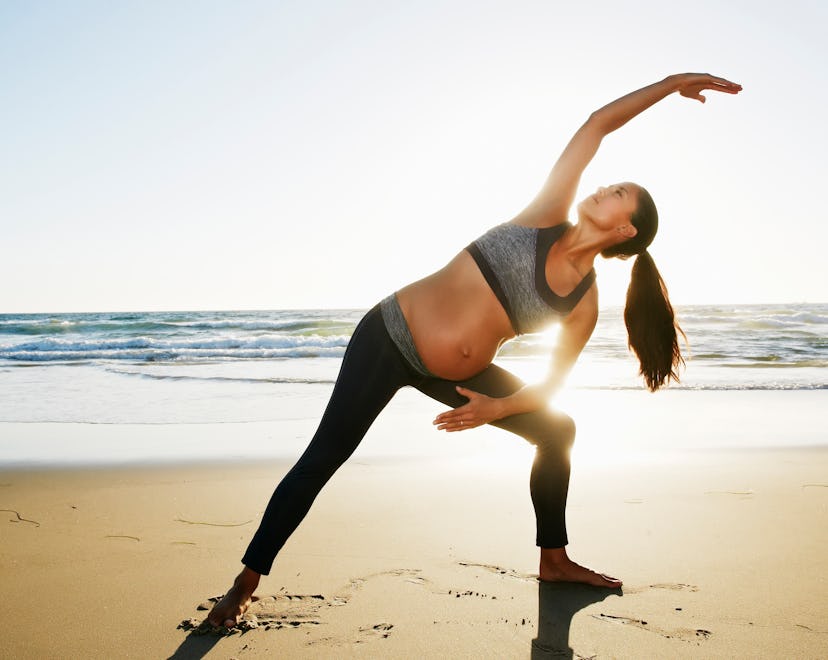Pregnancy

Cramps After Exercise During Pregnancy: When To Worry
Doctors explain what’s normal, and when to call your OB.
If you’re pregnant, you’ve likely heard from your doctor — or your aunt, your cousin, and your nosy next door neighbor — that continuing to exercise is important during pregnancy, and it’s recommended you get at least 30 minutes of light-to-moderate exercise every day. It doesn’t need to be anything too intense, necessarily. If you’re new to exercise, you can get your recommended workout in by simply going for a walk. I’ve been taking this advice to heart, but recently, after finishing a 30-minute walk at 6 months pregnant, I noticed some really bad cramping going on down there. I started to freak out, of course. But are cramps after walking during pregnancy dangerous? Or is it normal to experience some pelvic pain after exercise during pregnancy? When is it time to call a doctor, and how can a pregnant person know what’s safe and what’s not?
Cramps after walking during pregnancy
Even in typical pregnancies, in the later trimesters, exercising may cause Braxton Hicks contractions, which may be interpreted as uterine cramping, says Dr. G. Thomas Ruiz, an OB-GYN at MemorialCare Orange Coast Medical Center. So if you experience some cramps after walking during pregnancy, like I did, this is likely pretty normal. But why does it happen? Ruiz says, “Some perceived cramping may also be due to overtaxing muscles, which have been stretched due to pregnancy. This usually will resolve with rest.” However, any normal cramping after exercise should stop within 30 minutes to an hour.
Even though the cramping can be uncomfortable and concerning after exercise during pregnancy, it’s normal and it is (typically) not a reason to stop exercising, as long as it’s been cleared by your doctor or health care provider.
Benefits of exercise during pregnancy
Benefits of exercising while pregnant, according to Dr. Sherry Ross, an OB-GYN and women’s health expert, include improving the mental and physical health of both you and your baby. “Research shows that exercise has long term benefits for a pregnant woman staying healthy and active that continues during the lifetime of a baby,” Ross explains. Exercising also improves the “vascular smooth muscle of your baby’s heart,” she says. And can even decrease the baby’s susceptibility to heart disease throughout his or her life, Ross adds.
Exercising also decreases your risk of getting gestational diabetes, which could cause “dangerous complications to the baby,” Ross says. “When a pregnant woman develops gestational diabetes, this puts the baby at risk for being much larger than normal, which can lead to a dangerous shoulder dystocia (shoulders get stuck coming out of the vagina), stillbirth, and neonatal complications including low blood sugar, respiratory distress and longer days in the neonatal intensive care unit. Regular exercise decreases these types of risks.”
Want a smart as a whip baby? Exercise will help with that, too. “Exercise during pregnancy improves a newborn’s brain power. Exercising three times a week for 20 minutes has an amazing impact on the brain of a newborn, showing faster and more attentive responses to external sounds,” Ross says.
Pelvic pain after exercise during pregnancy: When to see a doctor
“When it’s associated with vaginal bleeding, nausea, vomiting, diarrhea, pain with urination, fever, fast heartbeat, and worsening pain,” Ross says you should contact your doctor right away. To get rid of those Braxton Hicks contractions and other cramping during pregnancy, Ross recommends resting and hydrating, which will help relax your uterine muscles.
Cramps after walking or exercising, especially in the later trimesters, are completely normal — since those already stretched muscles are getting a workout. If cramps last longer than about 30 minutes and are accompanied by bleeding, nausea, vomiting, diarrhea, pain when you pee, fever, fast heartbeat, or worsening pain, call your doctor or health care provider right away. Otherwise, walking during pregnancy or getting any kind of exercise you enjoy is a good thing for both you and your baby, as long as you can do it.
Experts:
Dr. G. Thomas Ruiz, an OB-GYN
Dr. Sherry Ross, an OB-GYN
This article was originally published on